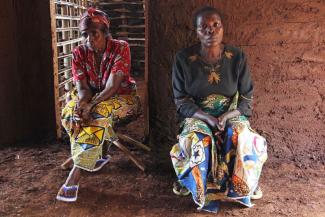Summer special
Unthinkable

The eastern DRC is a sparsely populated area and largely lawless, since rebel movements hold sway there. They terrorise the rural people and attack villages. They kill, rob and abduct women and children. In forest camps, the militia fighters often rape and torture women and girls.
Claudia Schmid travelled to the province of North Kivu twice and spent several months there. She found some women who had been abused and were prepared to speak about their traumatic experiences in front of the camera.
The film director did not only focus on women, however, but also interviewed men. Their statements reveal society’s deep-rooted misogyny. The men, who obviously have nothing meaningful to do with their lives, say that women must obey them without any reservations, and that those who do not so are not good wives and therefore deserve to be beaten and abandoned.
In Voices of violence, Vumilla and other women tell viewers what rebels did to them. Their gestures are vivid and expressive. Vumilla says that the men raped her and killed her little daughter before her eyes. Vumilla was abducted to a rebel camp with other women and kept as a sex slave for weeks. One of the most horrible episodes is told by Walungu. She had to watch fighters cut an unborn baby from a pregnant woman’s belly and then force her to eat it.
The women in the film cry and bend over in pain as they tell their stories. The viewer feels awful too and would like to cry along. To any sane-minded person, this kind of violence is unthinkable.
It is painful to watch this documentary, and one is tempted to leave the cinema or switch off the TV set. But we must not do so. Atrocities of this kind happen, and the public must know. Otherwise, nothing will change.
We all bear some guilt for what is happening in far-away eastern Congo. The rebels fund their militias by selling the resources that are exploited in the no-man’s land they control. Many of these minerals, Coltan, in particular, are needed to make smartphones. The rich world’s demand for those devices is fuelling conflict and violence in the DRC.
Claudia Schmid’s movie does not leave its audience in hopeless despair. On the contrary, it offers orientation in a double sense. On the one hand, it elaborates that consumers can put pressure on smartphone companies in order to change something. On the other hand, it shows that Vumilla and the other women have found help.
Missio, a Catholic aid organisation, is one of the few international agencies that are active in eastern Congo. It has set up rehabilitation centres for traumatised women. Vumilla says she would have lost her mind had she not gotten psychological assistance fast. The trauma centres help women to regain the courage they need to face life. The crucial thing is to talk about the horrors they have experienced. Many more facilities of this kind are needed in the DRC – and in the world’s other strife-torn places.
The documentary’s topic is deeply disturbing and stays on one’s mind for a long time. Perhaps some viewers will reconsider their naïve attitude to their mobile phones. There are a few manufacturers that avoid the use of conflict resources. Fairphone in the Netherlands and Shiftphone in Germany are two such companies. Moreover, one can support Missio’s campaign for “clean cell phones”.
Film
Voices of violence, 2016, Germany
director: Claudia Schmid
Links
Missio – Aktion saubere Handys (German):
https://www.missio-hilft.de/de/aktion/schutzengel/fuer-familien-in-not-weltweit/saubere-handys/
Fairphone:
https://www.fairphone.com/
Shiftphone (German):
http://www.shiftphones.com/









